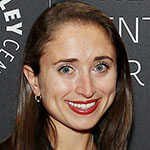Katie Glueck
Katie Glueck (BSJ12)
National political reporter at The New York Times

Why did you choose Medill?
In eighth grade, after spending a class career day shadowing reporters at the Kansas City Star, I decided I wanted to become a journalist. I went on to learn about Medill's reputation--probably in part because my mom is a Northwestern grad, too--and quickly decided I didn't want to go anyplace else. I applied early and am incredibly grateful Medill let me in!
What is your fondest memory of your time at Medill?
It's a tie between my Medill on the Hill experience here in Washington, which reinforced my interest in pursuing a career in political journalism, and my journalism residency at the Austin American-Statesman, a great paper in a great town, which generously gave a lot of responsibility to a very young reporter.
What was the greatest challenge you faced during your Medill career?
The science- and numbers-related classes journalism students are still required to take. Thank you for your patience with me, Professor Witte of the econ department!
Why do you think Medill is unique?
Medill gives students invaluable hands-on experience and incredible opportunities, whether that's empowering 19-year-olds to roam Capitol Hill or ensuring students get shoe-leather reporting experience in the neighborhoods of Chicago. Such activities really give Medill students a leg up. And perhaps most important, Medill instills a very strong code of ethics in journalism students. Working a beat, writing a punchy lede, developing sources--those are all things that can be learned on the job. A journalistic moral compass? Better to have that ingrained early.
What advice do you have for someone who might be looking to pursue a degree in journalism?
There's always a lot of talk about how the media industry is changing and how uncertain the journalism landscape is. That's true. But what's also true is that there will always be a need and an appetite for smart, objective, accurate, thorough, revelatory reporting. In today's fractured news environment, with claims of "fake news" flying around on both sides of the political spectrum, I'd argue that's especially true now. So if you're interested in journalism, don't let questions about the job market hold you back from exploring a degree. The jobs today look different than they did four years ago, and they'll look different again in four years, but there is and will continue to be an enormous need for energetic, talented young people who want to do good, fair, illuminating reporting.

